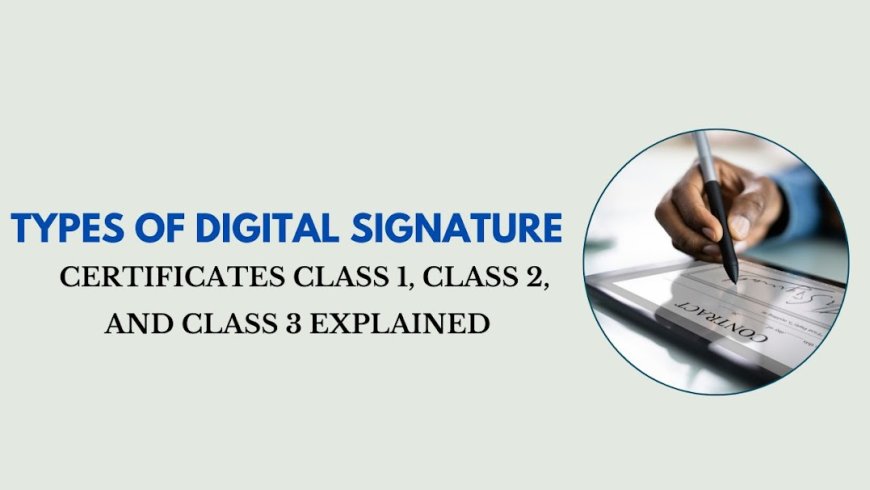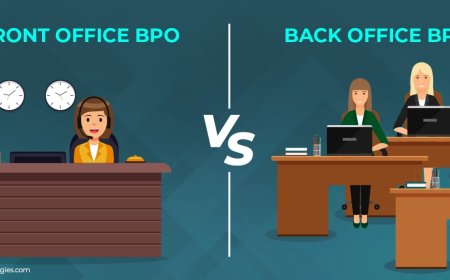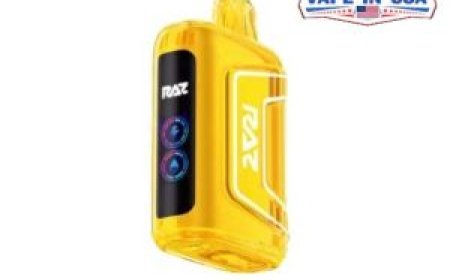Types of Digital Signature Certificates: Class 1, Class 2, and Class 3 Explained
A digital signature is like a digital form of your identity. It is issued by a Certifying Authority (CA) and is used to sign documents, emails, and transactions electronically

Introduction to Digital Signature Certificates (DSCs)
As the world moves towards digitalization, the need for secure online communication and transactions has become extremely important. One of the key tools used to ensure the authenticity and security of digital communications is the Digital Signature Certificate (DSC).
A digital signature is like a digital form of your identity. It is issued by a Certifying Authority (CA) and is used to sign documents, emails, and transactions electronically. It helps in verifying the identity of the person who is signing the document and ensures that the content has not been changed during transmission.
DSCs are widely used in India for filing income tax returns, GST applications, MCA filings, e-tendering, and many other government and private services. The Information Technology Act, 2000, gives legal recognition to digital signatures in India.
Digital Signature Certificates come in three main classes: Class 1, Class 2, and Class 3. Each class serves different purposes and offers different levels of security and assurance. In this guide, we will explain each class of DSC in detail, their uses, who should get them, and the differences among them.
Class 1 Digital Signature Certificate
What is Class 1 DSC?
Class 1 Digital Signature Certificate is the most basic type of DSC. It is issued to individuals and is mainly used to confirm the email address and name of the user. The verification for Class 1 DSC is done based on a simple online verification process, where the Certifying Authority checks that the applicants name and email address match the information in the CAs database.
Features of Class 1 DSC
-
Used for individual/low-security purposes
-
Suitable for internal company use (not for legal or official purposes)
-
Valid for verifying email communications
-
Contains basic user details such as name, email address, and some contact information
-
Does not require face-to-face verification
Use Cases of Class 1 DSC
-
Securing personal emails
-
Accessing secured zones within company networks
-
Signing documents in non-government portals (where high security is not required)
-
Used for personal applications where high-level validation is not essential
Who Should Use Class 1 DSC?
-
Individuals who want to secure their email communication
-
Users who need digital signatures for internal organizational use
-
People who are experimenting with digital signatures for the first time
Limitations
-
Cannot be used for legal or official filings such as Income Tax, MCA, or GST
-
Not accepted for e-tendering or high-security transactions
Class 2 Digital Signature Certificate (Now Deprecated)
What was Class 2 DSC?
Class 2 Digital Signature Certificates were the next level of DSCs and were used by both individuals and organizations. These certificates verified the identity of the user against a pre-verified database, such as PAN card records or government-issued IDs.
However, as of January 1, 2021, the Controller of Certifying Authorities (CCA), India, has discontinued issuing Class 2 DSCs for new applications. They have been merged with Class 3 DSCs to improve security levels and simplify usage.
Still, for understanding purposes, we will describe them.
Features of Class 2 DSC (When It Was Active)
-
Used for identity verification of individuals and organizations
-
Required document verification such as PAN, Aadhaar, and address proof
-
Used in many government-related transactions
Use Cases of Class 2 DSC (Earlier)
-
Filing income tax returns
-
ROC (Registrar of Companies) filings with MCA
-
Signing official government documents
-
Filing GST returns
-
Registering companies online
Who Used Class 2 DSC?
-
Chartered Accountants, Company Secretaries
-
Business owners and directors
-
Government officers and professionals
Why Was It Deprecated?
-
Security standards evolved and needed stronger authentication
-
The government aimed to standardize the use of Class 3 DSCs for both individuals and organizations
-
To reduce confusion and increase security, Class 2 was removed
Class 3 Digital Signature Certificate
What is Class 3 DSC?
Class 3 Digital Signature Certificate is the highest and most secure level of DSC. It is used in high-value, sensitive, and critical transactions, such as e-tendering, e-auctions, legal filings, and secure data exchange. It requires in-person verification or video verification of the applicant.
Class 3 DSC is now the only certificate available for new applications, as it covers all the requirements of the previous classes and provides enhanced security.
Features of Class 3 DSC
-
Highest level of authentication and encryption
-
Requires face-to-face or video KYC verification
-
Valid for individuals, organizations, and government officials
-
Ensures identity verification as well as transaction security
-
Can be used for all purposes from filing taxes to bidding in government tenders
Use Cases of Class 3 DSC
-
E-Tendering and e-Procurement
-
E-Auctions (government and private)
-
MCA filings (Ministry of Corporate Affairs)
-
Income tax return filing
-
Filing GST returns
-
Registering trademarks and patents
-
E-ticketing for travel agencies
-
E-banking and high-value transactions
-
Participation in Government e-Marketplace (GeM)
Who Should Use Class 3 DSC?
-
Business owners and company directors
-
Vendors participating in government or private tenders
-
Professionals like Chartered Accountants, Company Secretaries, and Lawyers
-
Government officials who handle digital approvals
-
Organizations dealing with secure communications
Why Class 3 is Essential Now?
After the removal of Class 2 DSCs, Class 3 DSCs became the standard for all digital signature requirements in India. It ensures:
-
Maximum protection against identity theft
-
Strong encryption for data
-
Legal validity and recognition under the IT Act, 2000
Benefits of Using Digital Signature Certificates
-
Time-Saving: You can sign documents quickly and easily without needing to print, scan, or fax.
-
Legally Accepted: Digital signatures are legally valid and recognized in courts and by government authorities.
-
Secure: DSCs provide strong encryption, making your data safe from unauthorized access.
-
Cost-Effective: Reduces paperwork and courier charges.
-
Environment Friendly: No need for physical printing, saving paper and resources.
-
Global Usage: Many digital signatures are valid for international communications as well.
Suggested Read Class 3 Digital Signature Certificate For eTender
Conclusion
Digital Signature Certificates have become a core part of digital transactions and governance in India. Understanding the differences between Class 1, Class 2, and Class 3 DSCs helps individuals and organizations choose the right certificate for their needs.
-
Class 1 DSC is suitable for personal email security.
-
Class 2 DSC, although now discontinued, was earlier used for moderate-level identity verification.
-
Class 3 DSC is the most secure and is now the standard for all digital signature needs.
With the increased reliance on digital communication, having a Digital Signature Certificate is not just an optionit is becoming a necessity. Whether you are an individual, a business professional, or a government official, choosing the right class of DSC will ensure you stay compliant, secure, and efficient in your digital interactions.
Let the move to paperless and secure digital transactions begin with a trusted digital signature.








































